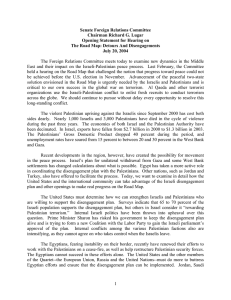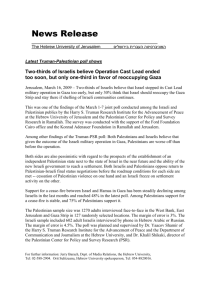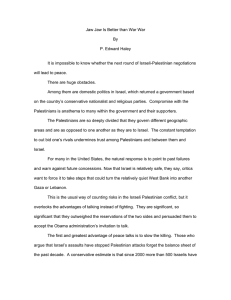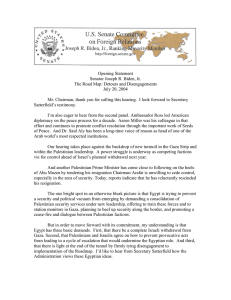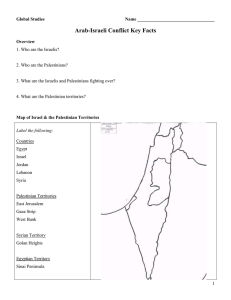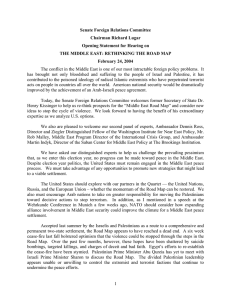“End of Conflict” and Other Fictions:
advertisement
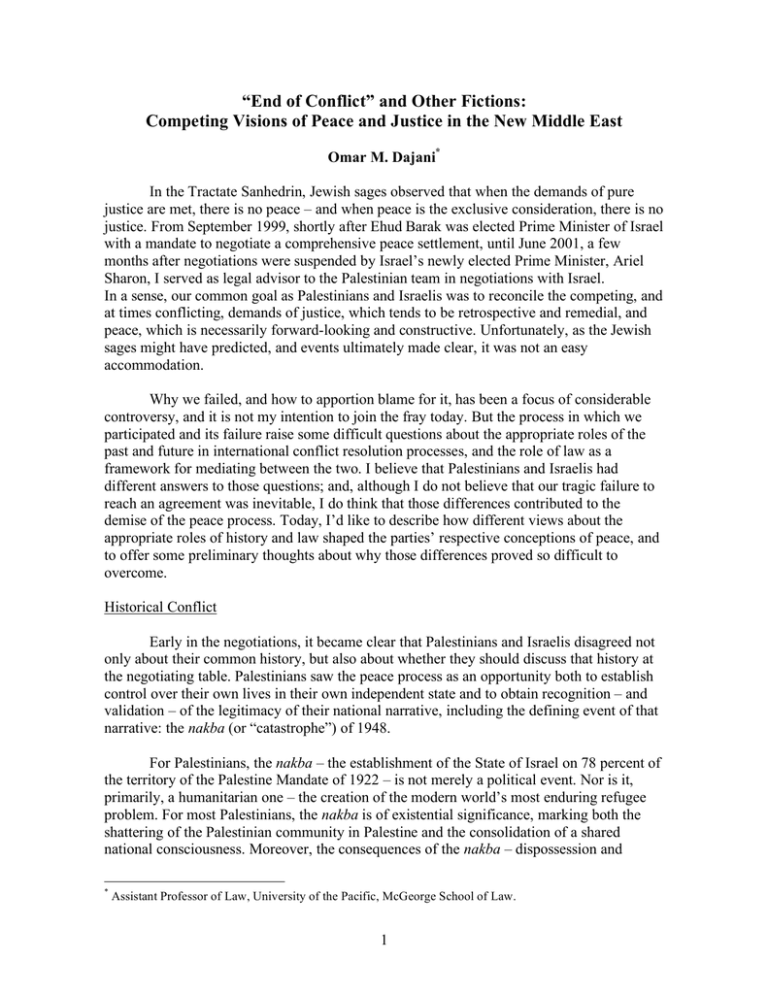
“End of Conflict” and Other Fictions: Competing Visions of Peace and Justice in the New Middle East Omar M. Dajani* In the Tractate Sanhedrin, Jewish sages observed that when the demands of pure justice are met, there is no peace – and when peace is the exclusive consideration, there is no justice. From September 1999, shortly after Ehud Barak was elected Prime Minister of Israel with a mandate to negotiate a comprehensive peace settlement, until June 2001, a few months after negotiations were suspended by Israel’s newly elected Prime Minister, Ariel Sharon, I served as legal advisor to the Palestinian team in negotiations with Israel. In a sense, our common goal as Palestinians and Israelis was to reconcile the competing, and at times conflicting, demands of justice, which tends to be retrospective and remedial, and peace, which is necessarily forward-looking and constructive. Unfortunately, as the Jewish sages might have predicted, and events ultimately made clear, it was not an easy accommodation. Why we failed, and how to apportion blame for it, has been a focus of considerable controversy, and it is not my intention to join the fray today. But the process in which we participated and its failure raise some difficult questions about the appropriate roles of the past and future in international conflict resolution processes, and the role of law as a framework for mediating between the two. I believe that Palestinians and Israelis had different answers to those questions; and, although I do not believe that our tragic failure to reach an agreement was inevitable, I do think that those differences contributed to the demise of the peace process. Today, I’d like to describe how different views about the appropriate roles of history and law shaped the parties’ respective conceptions of peace, and to offer some preliminary thoughts about why those differences proved so difficult to overcome. Historical Conflict Early in the negotiations, it became clear that Palestinians and Israelis disagreed not only about their common history, but also about whether they should discuss that history at the negotiating table. Palestinians saw the peace process as an opportunity both to establish control over their own lives in their own independent state and to obtain recognition – and validation – of the legitimacy of their national narrative, including the defining event of that narrative: the nakba (or “catastrophe”) of 1948. For Palestinians, the nakba – the establishment of the State of Israel on 78 percent of the territory of the Palestine Mandate of 1922 – is not merely a political event. Nor is it, primarily, a humanitarian one – the creation of the modern world’s most enduring refugee problem. For most Palestinians, the nakba is of existential significance, marking both the shattering of the Palestinian community in Palestine and the consolidation of a shared national consciousness. Moreover, the consequences of the nakba – dispossession and * Assistant Professor of Law, University of the Pacific, McGeorge School of Law. 1 statelessness – meant that Palestinians for many decades lacked control not only over their present and future circumstances, but also over their past. In addition to facing an adversary that denied the Palestinian narrative – as expressed most notoriously in former Israeli Prime Minister Golda Meir’s remark that “There was no such thing as Palestinians. . . . They did not exist.”1 – Arab governments also aimed to suppress Palestinian identity. In concrete terms, Palestinians for the most part lacked control over their children’s educational curricula and the attendant capacity to develop and propagate their own national narrative. I think this consistent lack of opportunity to tell the Palestinian story, and to feel that it had been heard, contributed to the tendency of Palestinian officials to dwell on history in negotiations with Israel. For example, at the outset of negotiations on refugees at Camp David, they presented a compendium of accounts of dispossession unearthed by Israel’s “new historians.” Similarly, the Palestinians’ arguments in favor of the 1967 borders were almost always prefaced by references to the historic compromise they had made in surrendering their claims to the 78% of mandate Palestine that is now Israel. From the start of negotiations, however, Israelis expressed impatience with discussions about the past, arguing that they were “unhelpful” – a waste of time that would only deepen enmity between the parties. Israeli Attorney General Eli Rubinstein crystallized this view in comments during a session about refugees at Camp David. He said: “Our vision is a humanitarian one. On the historical level, we can’t agree to be held responsible for the refugee problem. What happened in 1948 is the subject of controversy, and the peace process shouldn’t be the arena in which historical truth is pronounced.”2 Some Palestinians felt that this approach to history reflected an unwillingness to grapple with Israel’s past. Describing the session at which Rubinstein made the above comment, Palestinian journalist and political advisor Akram Hanieh later wrote, “In the absence of seriousness on the part of Israel, the discussion revolved mostly around the past, not the present or the future. The clash and difference between the two visions goes back to the 1948 Palestinian Nakba … to its very roots. [The Refugee Committee] was the most difficult committee because it was the reality committee, ruled by history. … It placed Israel in front of her direct victims, in front of the witnesses to its crimes. It was strange because Israel continued to deny its crime. There is a complete denial of the Nakba and of the Israeli responsibility in causing it. … When the Israelis were presented with the memoirs and the testimonies of their own generals, they rejected them.”3 This bitterness was compounded by the tendency of Israeli officials to speak in ways that, to Palestinians, seemed a-historical. As Clinton advisor Robert Malley pointed out in the New York Review of Books, “The notion that Israel was ‘offering’ land, being ‘generous,’ or ‘making concessions’ seemed to [Palestinians] doubly wrong—in a single stroke both affirming Israel's right and denying the Palestinians'. For the Palestinians, land was not given but given back.”4 2 Lawlessness The parties’ views regarding the value of international law as a framework for resolving the conflict were similarly divergent. In the months leading up to the negotiations, the Palestinian legal team spent hundreds of hours preparing legal arguments for the negotiations, commissioning, for example, three separate studies on the drafting history of UNSC resolution 242 and elaborate point-counterpoint talking points for the negotiators on topics like the implications of the UN Convention on the Law of the Non-navigational Uses of International Watercourses. In retrospect, I suspect that the nature of our preparations was driven in part by the professional background of the Palestinians’ legal advisors, who perhaps failed to appreciate the differences between international peace negotiations and the corporate litigation and deal-making in which we had been involved before heading to Ramallah. At least to some extent, however, our approach was also driven by the centrality of international law to Palestinian claims to legitimacy. In public advocacy, Palestinian officials tend to refer frequently to what they call “the international legality” – by which they mean the array of UN resolutions and other legal instruments that support Palestinian positions. As one of my former colleagues put it, Palestinian children are able to recite, “194, 242, 338” – the numbers of the relevant UN resolutions – before they’re able to count. For Palestinians, law confers legitimacy; it provides a foundation for Palestinian arguments, and, in the public’s eye at least, a basis for evaluating results. Our Israeli counterparts saw law differently. I will never forget one of the first negotiation sessions in which I participated: a meeting to discuss borders in December 1999. The Palestinian negotiator, a former general in what had been called, aspirationally, the Palestine Liberation Army, argued that discussion should begin with a dialogue between the two sides’ legal advisors regarding the legal framework for the negotiations. The Israeli team objected that we would never commence negotiations if we began with legal arguments, but they eventually acquiesced. I figured that my moment had arrived. Armed with three large binders of legal materials, I began a lengthy disquisition on the applicability and implications of the Fourth Geneva Convention. Near the end of my intervention, just as I was describing the position of the International Committee of the Red Cross on the issue, my Israeli counterpart interrupted me and said, “Omar, with respect, we don’t care who thinks the Convention is applicable. The Government of Israel does not, and unless you want to take it up with the Security Council, I think that’s the end of the discussion.” That meeting was, effectively, the end of the legal discussion: The Palestinian team tried to present legal arguments on a few further occasions, but they were greeted by similar responses from both the Israeli team and American mediators. At one meeting at Camp David, when Palestinian negotiator (and now Prime Minister) Ahmad Qureia’ argued that “international legitimacy means Israeli retreat to the border of June 4, 1967,” President Clinton exploded, screaming, “This isn’t the UN General Assembly. If you want to give a 3 lecture, go over there and don’t make me waste my time. You’re obstructing the negotiation.”5 I do not want to over-simplify. It would be disingenuous to claim that Palestinian officials were wholly committed to the rule of law – either inside or outside the negotiating room. Moreover, while Israeli negotiators were unwilling to embrace public international law as a framework for resolving the parties’ respective claims, they did tend to acknowledge the force of the bilateral agreements that the parties had reached during the 1990s. Whereas the Palestinian side tended to see international law in normative, prescriptive terms, however, the Israeli side tended to regard see it in more utilitarian terms – a tool to be used or ignored, depending on its helpfulness. For example, the Palestinians talked about the need to “implement Resolution 242,” while Israelis proposed framing whatever accommodation the parties could reach as “the implementation of Resolution 242.” “End of Conflict” I believe the parties’ different views about how to address their past and the obligations it imposed on them contributed to their difficulties in defining their common future. One issue in which this tension became apparent was in discussions about including an “end of conflict” clause in a framework agreement. Shortly after entering office, Prime Minister Barak succeeded in convincing the Palestinians to adopt a two-phased approach to reaching a peace deal, following on the format of earlier agreements with Egypt and Jordan. First, the parties would reach a “framework agreement” outlining the broad principles on which the peace deal would be based. Then, the parties would conclude a comprehensive agreement ironing out the details. All of this would be achieved within a year – by September 13, 2000. From the Israeli perspective, a key element of a framework agreement would be a joint declaration by the parties that the agreement marked the “end of conflict” and resolved all claims between them. According to Barak, nothing less would convince Israelis to accept the substantial compromise demanded of them. The Palestinians, on the other hand, were prepared only to accept a clause providing that “the implementation of the agreement will represent the end of conflict.” Palestinians argued that “end of conflict” would be achieved only when the wrongs that were at the source of the conflict were righted. The conflict over “end of conflict” would subsequently lead to extremely damaging misattributions of motive by both sides: Israelis saw the Palestinians’ position as a reflection of an inability to come to terms with Israel’s existence and as a veiled attempt to preserve their latitude to pursue a “phased approach” to achieving Israel’s destruction. The resumption of Palestinian suicide attacks in Israeli cities west of the Green Line only served to confirm this view. Palestinians, on the other hand, saw the Israelis’ position as proof that Israel had no intention of actually implementing a peace deal. They came to believe that Israel wanted to reap the benefits of the legitimacy that an agreement would confer while maintaining total control over Palestinian territory during what they predicted would be interminable negotiations of a comprehensive agreement. The Israelis’ unwillingness to 4 implement their commitment in earlier agreements to withdraw from additional West Bank territory served to confirm this view. To a certain extent, these tensions emerged from the power disparity between the parties. The Palestinians, controlling a tiny portion of the territory in dispute (and only partially at that), would benefit from a peace agreement only to the extent that it was implemented, and they possessed few levers for exerting pressure on Israel other than withholding an accomplishment. Israel, on the other hand, had as much to gain from the fact of an agreement, as from its implementation: the Palestinians had already committed to promoting Israeli security in the Oslo agreements (which arguably had been Israel’s main reason for entering the peace process), so the primary dividend of a peace agreement would be enhanced international legitimacy. I believe, however, that the way the parties discussed their conflict served to exacerbate these kinds of tensions. Palestinians and Israelis were attempting to build a historic peace without reference to history and to define new legal rights and obligations without reference to law. Having abandoned both of these disciplines, the parties tended to frame their claims and arguments in the considerably less disciplined language of politics – with both practical and intangible consequences. In practical terms, the failure to define the legal foundation on which an agreement would be built meant that shortcuts such as incorporating other norms and legal instruments by reference were unavailable. Like two parties negotiating a contract without the benefit of a commercial code, we had to address each and every detail in the agreement, diminishing efficiency and heightening tensions. More intangibly, I think that the silencing of discourse about the historical origins of the conflict and the international legal framework for resolving it served to undermine mutual confidence – each side feeling that the other had never truly recognized the legitimacy of its national narrative. As a result, “end of conflict” came to feel like another fiction rather than a shared goal. I do not propose that the parties transform negotiation into litigation – or into a history seminar. But when Palestinians and Israelis eventually return to the difficult process of deciding how to live together (and return they will, “barriers” notwithstanding), they will need to search for more constructive ways of discussing their common past – and the legal rights and obligations it creates – if they are to forge a peaceful and secure common future. 1 The Sunday Times (London), June 15, 1969, at 12. Charles Enderlin, Shattered Dreams: The Failure of the Peace Process in the Middle East, 1995-2002, (New York: Other Press, 2003) ( Susan Fairfield, trans.), pp. 197-98 (emphasis added). 3 Akram Hanieh, The Camp David Papers (Ramallah: Al Ayyam Press, 2000) p. 46. 4 Hussein Agha and Robert Malley, “Camp David: The Tragedy of Errors,” New York Review of Books, vol. 48, no. 13, (Aug. 9, 2001). 5 Enderlin, at 202. 2 5

